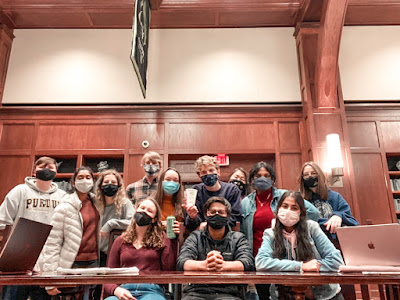Purdue Engineering with the Honors College
Purdue Engineering with
the Honors College
The Purdue Honors College is much like any other learning community on campus; students part of Honors share common academic goals and attitudes, and have a multitude of opportunities to come together in coursework and extracurricular work. But how can the Honors College impact your experience as an engineering student?
A large part of the Honors experience centers around fostering collaborative learning. Even architecturally, the Honors College residences seem to encourage building diverse, global communities; through their active learning classrooms, lounges to study and hang out in around every corner, and the Harry Potter-esque house structure. That’s right ― the Honors College has houses, just like in Harry Potter! Each floor from both residence halls is part of one of five houses that compete against each other year long in house competitions, point submissions, and extracurricular work to win the House Cup at the end of the school year. Though all of these aspects are inherently interdisciplinary, Honors strives to be interdisciplinary through its academics, too. Yet, this fact sometimes drives students away from applying to the Honors College before they have to chance to learn more.
What is the Honors Curriculum?
1. 5 HONR Credits
The Honors College requires that 5 credits of your entire 4 years’ worth of coursework (around 140 credits total!) come from Honors-specific classes ― those marked as HONR courses on your schedule. You get 2 of these credits from the seminar classes you take your freshman year, which are both a fun introduction to the pillars and values of the Honors College. Then, you only have 3 more credits to earn in this category! These can be earned from classes spanning a variety of genres, from “Scenes of Crime & Death” to “Russians, Rockets, & Space” and even “Pop Culture Classics”.
2. 19 Honors Electives
Additional courses that qualify as Honors material are required for an Honors College degree. These include HONR classes from the previous category, but are also inclusive of Honors-approved elective classes (that often count towards your major!) Furthermore, students have the option to contract a non-Honors class for Honors credit, meaning they work with their advisor to alter the syllabus of one of their classes to make it more interdisciplinary, relative to the Honors College values. On top of that, if you intend to study beyond an undergraduate degree, graduate-level courses and working on research all count towards Honors credit!
3. Good Standing
Retaining good standing with the Honors College comes down to 3 simple factors: taking 1 Honors course each academic semester (excluding full semesters studying abroad); maintaining a 3.5 or higher cumulative GPA; and completing an Honors advising appointment each academic year. Registering for at least one Honors course is an easy way to ensure you are earning your Honors credits on a regular schedule, in time for graduation. And maintaining a 3.5 GPA is an excellent way to open more doors for yourself after graduation! Then finally, having an advising appointment with your Honors advisor once a year helps you stay on track of all of these factors, and balance them in a more manageable way.
4. Thesis or Scholarly Project
Lastly, the Honors College requires its students to all create an Honors capstone project by the end of their 4 years, which produces new knowledge in some form. Yes, this can seem like a tall task at first, but in reality, opportunities for research and independent endeavors are frequently presented to students just as part of the Honors experience. Your professors and advisors are more than willing to guide you through this process, and any research you may partake in during your time on campus can be derived from to create a project more centered on your interests for Honors. Plus, you can have your cake and eat it, too, because your Scholarly Project will look great when applying to work in industry or to continue your education further!
As you now know, the Honors academic experience doesn’t take away from your experience as an engineering student; it simply adds a few more criteria that are definitely helpful in the long run. And not only do these extra requirements aid in academic growth, but they are instrumental in personal growth when considering what your own values and motivations are, and how you can apply them to the world.
On top of that, Honors isn’t just about academic enrichment! The aforementioned house system fosters lots of community development through house dinner’s, floor traditions with your RHP’s (Residential Advisors), and house events! Honors has plenty of its own events, too, like the annual Spread the Love booths, pet-a-puppy and tea/hot chocolate stands during finals weeks, lip-sync battles, dance competitions, and trips to Chicago, ski resorts, or even Transylvania! (See Dr. Facinelli’s renowned study abroad all about Dracula and vampires here.
We recognize that the added Honors College experience is not for everyone, but we hope that we helped debunk some common fears about Honors, as well as clear up any doubts you may have had about whether or not to apply to Honors. Personally, being part of the Honors College is essential to my time as a Boilermaker, and I could not imagine being at Purdue without being able to call Honors my home. Still, I hope I’ve helped some of you make a more educated decision about joining the Honors College after reading this blog post! For more content about just as diverse topics surrounding being a student at Purdue, stay tuned to weekly blog updates here!
― Mili Jha, WE Link LT
Stay Connected With Purdue WIEP!
Facebook: Purdue Women in Engineering
Twitter: @purduewiep
Instagram: @purduewiep
Blog: purduewiep.blogspot.com
Email: welink@purdue.edu
Use the hashtag #PurdueWIEP on Facebook, Instagram and Twitter!
Tweets by PurdueWIEP



Comments
Post a Comment